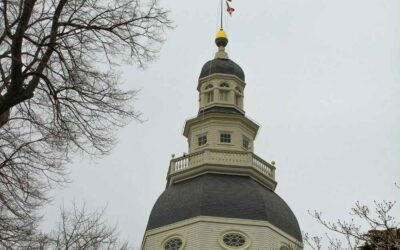Maryland’s Joint COVID-19 Response Legislative Work Group shares weekly briefings to update the public on Maryland’s response to the coronavirus panic, and includes updates from key experts in managing this public health emergency. Today’s update included briefings from the Maryland Department of Commerce, the Health Facilities Association of Maryland, and the Maryland Department of Labor.
Find key takeaways from the briefing below:
Updates from Maryland Department of Commerce
Briefing from Secretary Schulz
- Maryland COVID-19 Emergency Relief Grant Fund Overview
- Certified 4,763 grant applications totaling $46.8 million (as of May 5)
- Received 20,190 applications totaling over $195 million.
- There was $50 million allocated to the grant fund.
- Applications received on March 23 and 24 will utilize the vast majority of the $50 million.
- More than $1 million in grants from those first two days will go to nonprofits.
- If more money is allocated to the fund, additional processing will continue
- Maryland COVID-19 Emergency Relief Loan Fund Overview
- We have certified 239 loan applications totaling $10.9 million (as of May 5)
- There was $75 million allocated to the loan fund.
- Maryland COVID-19 Emergency Relief Manufacturing Fund Overview
- Certified 44 grant applications totaling $3.3 million dollars (as of May 5).
- There were $5 million dollars allocated to the loan fund to support manufacturers producing PPE.
- Companies are making face shields, masks, gowns, ventilators & ventilator compliments, battery packs, and other PPE.
Questions & Answers
Delegate Maggie McIntosh: In regards to the critical needs list, who helps determine which manufacturers receive money and who determines the critical needs list?
Secretary Schulz: Critical needs list is determined in collaboration with the MD Department of Health and the MD Emergency Management Agency. They work collectively with local health departments and hospitals.
Senator Jim Rosapepe: How are manufacturing grants tied to actual orders from the state and county government?
Secretary Schulz: Once they are approved, there is a team of individuals at the State Emergency Operations Center. There are several state agencies vetting lists currently.
Delegate Eric Luedtke: Do we have a sense of when grants will be disbursed to businesses? Is there a goal date?
Secretary Schulz: Grant funds are moving forward, the comptroller is issuing checks. Not everything has been on hold. With the increase in personnel, we anticipate a faster process for them to send grant applications back. It will also depend on how long the receiver takes to sign and return the application.
Senator Delores Kelley: What are we doing to assess the PPE needs in assisted living?
Secretary Schulz: No concrete answer. That is being done through the MD Department of Health.
Delegate Sheree Sample-Hughes: What is your level of responsibility or input in the process of Ocean City opening this weekend? Do you play a role in that process?
Secretary Schulz: The Department of Commerce has put together 13 industry advisory groups. They have been meeting to discuss potential guidelines for opening. All of their recommendations will be considered by the governor.
Senator Clarence Lam: Do you have any information on how much PPE is being produced? What is the distribution plan? Are they going to local Maryland needs or being sold out of state?
Secretary Schulz: I believe that the governor put out some information on PPE recently. Anything the state is purchasing is going to state use.
Delegate Joseline Pena-Melnyk: Are you collecting data regarding racial and ethnic backgrounds of these companies? If so, what is that picture telling you?
Secretary Schulz: Applications that went out to businesses did not require the applicant to disclose that information.
Senator Melony Griffith: What is the timeline expected for loan distribution?
Secretary Schulz: We had to internally prioritize the grants to get those funds out. Loans continue to be reviewed daily, some loans have been awarded already.
Delegate Michael Jackson: Is there a timeline on distribution of test kits?
Secretary Schulz: The Department of Commerce is not involved in the distribution of the test kits. We know that the priority is going to be hotspots.
Senator Steve Hershey: Has there been any consideration to an appeals process for a non-essential manufacturing businesses to be able to open up if they have received approval from a county officer and maybe seek an exemption process?
Secretary Schulz: The manufacturing advisory group is one of the most active groups, they have submitted concise reports. Have not heard of an exemption process.
Health Facilities Association of Maryland
Briefing from Joseph DeMattos, Jr., President
- We have 226 nursing and rehab centers in Maryland. Those centers have 18,000 beds, we probably have around 16,000 people in those beds.
- We have 36,000 employees.
- We have 3,218 confirmed Covid-19 cases with residents, 1,489 confirmed cases with the staff.
- 525 reported deaths amongst residents, 8 reported staff deaths.
- Something to know is among residents there are many with DNR’s, some are in hospice care.
- We issued our first alert of Covid-19 on January 24th based on CDC guidance.
- In February, we were preparing our centers for defensive battle to keep Covid-19 out as long as we could.
- On March 10th we advocated to stop visitations at our centers.
- On March 15th we had our first confirmed case in Elkridge.
- On April 2nd we asked the state for a list of buildings that have Covid-19 positive patients. They responded that for legal reasons they could not release that information.
- In late March and early April there was concrete data from doctors saying that they were experiencing Covid-19 as being largely asymptomatic.
Questions & Answers
Senator Nancy King: Our local Sunrise is able to get test kits for those that are sick, but are unable to get tests for the staff.
Joseph DeMattos: Testing is a major problem. Different counties have made different requirements for testing, which is not helpful. The state needs to have supremacy moving forward.
Senator Delores Kelley: Concerned about those in assisted living. Would you agree that we have a mess that needs to come to light?
Joseph DeMattos: The majority of the governor’s orders do not apply to assisted living, which is a potential blind spot. I agree with your assessment and it is an issue that needs attention.
Delegate Sheree Sample-Hughes: What is the best practice, for example, on station one they have had about 20 patients test positive and are bringing over positive patients from another unit. Also concerned about funeral home attendants not having the proper PPE.
Joseph DeMattos: The best practice is to put together in one unit the people who are positive and the use of infectious disease protocol for everyone working in the center.
Delegate Michael Jackson: is there any information regarding testing in nursing homes and the challenges you may have?
Joseph DeMattos: There aren’t sufficient supplies, we have asked and advocated for testing. I’m optimistic on testing going forward.
Senator Jim Rosapepe: Can you estimate how many tests your industry needs on a monthly basis and how many you have now?
Joseph DeMattos: We have very few. We have to call and request tests when we need them. The real problem is how many test will be needed to test the staff regularly.
Delegate Maggie McIntosh: Can you update us on the state reimbursement rate setting system?
Joseph DeMattos: Today in MD the per day average is $273, which is the same as it was in January of this year. The general assembly passed a 4% rate increase, which would be $285 per day. Congress passed Medicaid relief for states. A 6.2% increase in the Medicaid rates that go from January 1st to the last day in the quarter to the end of the federal emergency. For Maryland the allocation was $550 million. In the CARES Act, states received direct payment. Under CARES Maryland received $1.5 billion.
Department of Labor
Secretary Tiffany Robinson – Maryland Department of Labor
- Our updated system launched last week and is now capable of handling the high volume of traffic.
- Over 350,000 weekly certifications came in last week, before the pandemic there were about 29,000 weekly certifications.
- We have had to pay out over $170 million in benefits to Marylanders, before the pandemic we were paying between $4-7 million a week in benefits.
- The site is being taken down nightly from 1:00am – 3:00am on a temporary basis for maintenance and diagnostics.
- There is a mobile app in the testing phase right now.
- We have launched a virtual assistant on the website.
Questions & Answers
Delegate Dereck Davis: Based upon the amount of claims you have seen thus far, do you think we will have to shift from Table A to Table F?
Tiffany Robinson: I hope we are not down graded to a lower table because our trust fund is still healthy. I just received a report that many MD businesses are continuing to pay their taxes on time, which is very good for our trust fund. We have already been offered 0% interest loans from the federal government. Maryland is requesting the federal government to replenish the states trust fun with grants.
Speaker Adrienne Jones: When do you anticipate that the backlog of payments issue will be resolved?
Tiffany Robinson: Hard to answer because every single claimants situation is different and we are paying a large percentage of our claimants.
Download the full slidedeck from the briefing here.
If you have any questions or concerns explore our COVID-19 resource page, or reach out to us directly at 410-321-8200.




